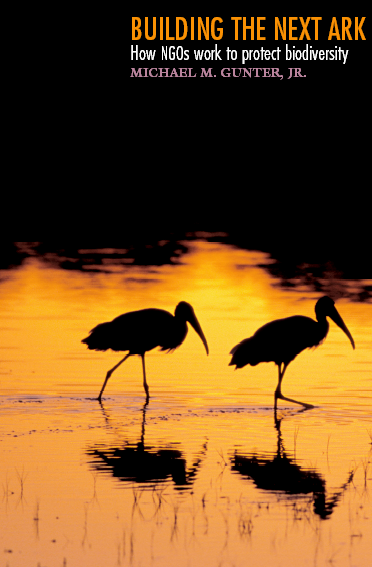
Critical Reviews of
Building the Next Ark
A 2006 Sprout Award nominee, Building the Next Ark has been favorably reviewed by national and international publications such as the Canadian Journal of Environmental Education, Choice, Environment, Environments, Global Environmental Politics, International Studies Review, Journal of International Wildlife Law & Policy, Kliatt, NAAEE Communicator, Natural Resources Journal, the United Nations Environmental Program’s magazine, Our Planet, and the non-profit journal Voluntas. See this December 2005 edition of the Orange Audubon Society newsletter, OASis, for a local, Central Florida endorsement. Excerpts from these and other reviews can be found below:
A welcome contribution…Written with the scrutiny of a political scientist and the heart of an environmentalist…This book appeals to both academics and practitioners alike. Members of the environmental field will benefit from this book’s intermingling of the empirical and theoretical…Practitioners should be eager to apply the lessons of this sector in their own work.
Cristina M. Balboa
School of Forestry & Environmental Studies
Yale University
Voluntas: International Journal of Voluntary and Nonprofit Organizations
Vol.17:3 (September 2006), pp.272-274
This is an important and much-needed book on a vital subject. Using thorough, hands-on scholarship, Gunter delineates the role of the NGOs as the spearhead of the global conservation movement. He delivers balanced accounts of their strategies, their relationship to governments and the public, their successes and their vulnerabilities.
E.O Wilson
Two-time Pulitzer Prize Winner
Pellegrino University Professor Emeritus
Harvard University
Gunter establishes an important first step…The book is also important because it helps us to understand the broader landscape within which international environmental NGOs operate, pointing out which groups fulfill which functions and where there are significant gaps and needs in the conservation community.
Joseph Domask, American University, Washington D.C.
Washington Semester Program and School of International Service
Journal of International Wildlife Law and Policy, 10:2, (April 2007), pp. 211-214
Persuasive and adds a much-needed, and timely, NGO dimension to the existing literature on biodiversity conservation and protection…Should be required reading for those engaged in the day-to-day struggle to conserve global biodiversity, and would be a valuable addition to most environmental NGO libraries.
Brent Doberstein, Faculty of Environmental Studies
Unversity of Waterloo, ON Canada N2L 3G1
Environments: A Journal of Interdisciplinary Studies
vol.34:1 (2006), pp.95-97
Building the Next Ark is a very important contribution. Gunter writes clearly and accessibly for a broader audience. Work examining NGOs’ pragmatic approaches to socio-environmental problems are too few and far between.
Ilan Alleson, Department of Public Health Sciences
University of Toronto
Canadian Journal of Environmental Education
vol.11 (2006), pp.226-227
Offer[s] a detailed prescription for how [NGOs] can improve their species protection efforts.
Our Planet, magazine of UNEP, vol.16:2 (2005), p.27
Devoid of dogma and propaganda, this book provides an important historical perspective on how U.S.-based NGOs have engaged political leadership in tackling conservation challenges in this country and internationally, and in doing so it also highlights the importance of engaging the UN and its processes for success.
The Honorable Timothy E. Wirth
President, United Nations Foundation
and former U.S. Senator (D-CO)
Building the Next Ark is a valuable resource for anyone working with or in an NGO. However, it may be even more valuable for someone like me, an environmental educator without a political science or economics background. The book is readable and enjoyable.
Karen Cairns, Center for Environmental Policy and Management
and Environmental Finance Center, University of Louisville
North American Association for Environmental Education, vol.36:3 (Summer 2006), p.5
The rich detail and examples make this volume a lively read that would be an excellent addition to any library on NGOs or biodiversity.
Shannon K. Orr, Bowling Green State University
Global Environmental Politics, , 6:1 (Feb. 2006), pp. 127-128
I found this book to be very informative and enlightening. Gunter gives a comprehensive and impartial look at the various ways that NGOs help shape national and international environmental policies…A must read for anyone who cares about the environment and seeks a better understanding of what can be done and different ways to do it.
Claire Hilliker, OASis Editor
Orange Audubon Society, vol.41: 4 (Dec. 2005), p.3
Building the Next Ark is a well-presented volume that represents a substantial and timely contribution to the literatures on international organizations, political sociology, and environmental studies. Given the quality of the critical thinking exercise undertaken by Gunter, Building the Next Ark will be useful in many ways to a variety of readers...regardless of their issue area, the managers and staff of nongovernmental organizations (NGOs) will find it particularly worthwhile to reflect upon Gunter’s analyses…policymakers, in turn, will get a glimpse at the inner workings of these NGOs and will be able to reflect upon their own responses to them. Students, teachers, and scholars interested in NGOs and civil society will find emerging theoretical frameworks that are developed in a clear, concise manner.
Lawrence T. Woods
Department of International Studies
American University of Sharjah, United Arab Emirates
International Studies Review, 7:3 (Sept. 2005), pp.484-486
Although NGOs now play an absolutely critical role in the protection of biodiversity globally, it is quite remarkable how little is known about their modus operandi and strategies. This excellent appraisal adds much to our knowledge of conservation NGOs, by outlining where they sit as players in the international setting, and going on to explore their activities and approaches in detail.
NHBS Environment Bookstore
The book is valuable for its excellent presentation of the transnational and interdependent nature of biodiversity protection, the creative framework for looking at NGOs, and the wealth of information about an under-researched, yet crucially important, topic. Summing Up: Highly recommended. Lower-division undergraduates and above.
R. E. O'Connor
National Science Foundation
CHOICE Jul/Aug 2005
Useful overview, with cogent explanations of debt-for-nature swaps and other strategies.
Philanthropy UK, Issue 21 (June 2005)